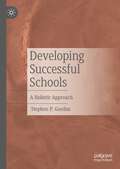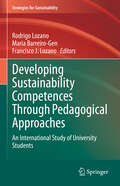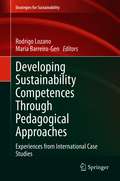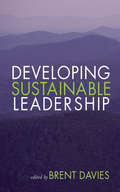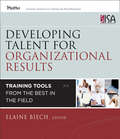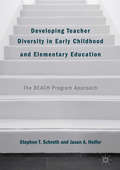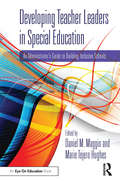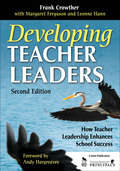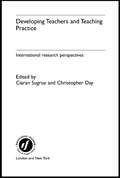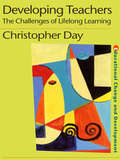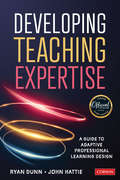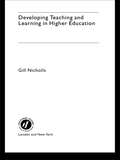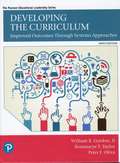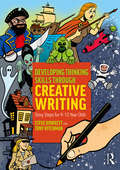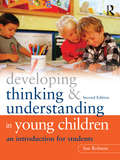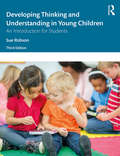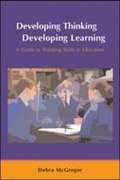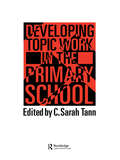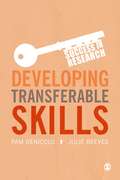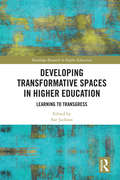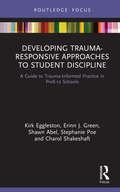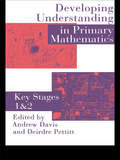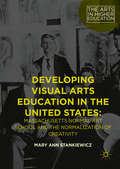- Table View
- List View
Developing Successful Schools: A Holistic Approach
by Stephen P. GordonThis book identifies and emphasizes the need for a holistic approach to school improvement when it comes to both the development of the whole child and the relationships among student, family, and community development. In recent years, the emphasis in PK-12 education in the United States has been on the measurement of student and school performance by high-stakes achievement tests. This emphasis has resulted in a narrowed curriculum emphasizing lower-level cognitive learning, with little attention paid to the moral, social, and creative development of students, families, and communities. This book argues that PK-12 education needs to shift its focus to holistic qualities of the successful school, qualities that reflect a moral rather than a technical approach to education while also improving students’ academic performance.
Developing Sustainability Competences Through Pedagogical Approaches: An International Study of University Students (Strategies for Sustainability)
by Rodrigo Lozano Maria Barreiro-Gen Francisco J. LozanoThere has been considerable progress in the incorporation of sustainable development into the curricula of higher education institutions. Study on these developments has included research on competences for sustainable development and pedagogical approaches to develop such competences. However, there has been limited research on the connection between how courses are delivered (i.e. pedagogical approaches) and how they may affect sustainability competences. This book examines pedagogical approaches for developing sustainability competences through comparing 17 higher education institutions from 13 countries, analysing how students&’ perception of how sustainability competences are being developed and which pedagogical approaches are being used for this purpose. This book brings together practice-based original research on the connection between developing sustainability competences and the pedagogical approaches used.
Developing Sustainability Competences Through Pedagogical Approaches: Experiences from International Case Studies (Strategies for Sustainability)
by Rodrigo Lozano Maria Barreiro-GenThis book is aimed at developing sustainability competences through pedagogical approaches by comparing 15 case studies from 12 countries in 4 continents (Africa, America, Australia, and Europe) analysing how Sustainable Development (SD) is being taught in their courses, which competences are being developed, and which pedagogical approaches are being used to develop the competences. The book brings together practice-based original research on the connection between developing sustainability competences and the pedagogical approaches used, utilizing a framework aimed at helping educators in creating and updating their courses to provide a more complete, holistic, and systemic sustainability education to future leaders, decision makers, educators, and change agents. Compared to previous works addressing SD in education, which often mostly cover tools for improving the sustainability of campus operations, this approach uses assessment tools to uniquely focus on how courses and programmes (i.e. curricula) incorporate SD. Through the case studies, readers will learn about how the 3 major groups of pedagogical approaches have been used: (1) Universal, meaning broadly applicable pedagogies that have been used in many disciplines and contexts; (2) Community and social justice, which are pedagogies developed specifically for use in addressing social justice and community-building; and (3) Environmental education, which are pedagogies emerging from environmental sciences and environmental education practices.
Developing Sustainable Leadership
by Brent Davies`This book tackles the leadership question by looking both outward and inward, the latter being how to sustain oneself as a leader...Developing Sustainable Leadership is an important contribution to the field of educational leadership' - Education Libraries `This collection of pithy analysis and insightful solutions will be easily assimilated by school leaders, policy makers and community stakeholders who will, with relative ease, be left eager to recontextualise the wisdom within to their own unique circumstances' - ESCalate `School leaders and teachers know a lot more than they think they do. So, what prevents the release of that creative energy? Look, no further than this thought provoking collection of essays from world leading scholars. It treats us to a kaleidoscopic view of what we do know, what we ought to know and what we urgently need to do to harness the power of sustainable leadership. Policy makers, please take careful note!' - John MacBeath, Professor Education Leadership, University of Cambridge With increasing accountability pressures, developing and sustaining leaders is a major challenge for all those involved in education today. This book brings together eleven outstanding writers to provide insights, frameworks and ideas on how we can sustain our school leaders and develop values-based leadership in order to counter the short-term management solutions that abound. Andy Hargreaves, Dean Fink, Michael Fullan, Brent Davies, Ken Leithwood, David Hopkins, Geoff Southworth, Brian Caldwell, Chris Day, Terry Deal and Gib Hentschke represent some of the most powerful thinkers and writers in the educational leadership field who respond to the challenge of how we can develop and sustain our school leaders. While a great deal has been written on preparation for leadership, this book takes leadership thinking to the next level by providing strategies for enhancing and empowering the leaders we have. This book is a key source of ideas, insights and frameworks for all those involved in sustaining our school leaders. 'Offers a clarity to complex problems that enables both the academic and general reader to identify with the issues dealt with...the book is an enjoyable insight into several leaders' view on leadership, which Brent Davies has pulled together well and which will be of use to headteachers, aspiring leaders and academics alike' - International Journal of Educational Management
Developing Talent for Organizational Results
by Elaine BiechThe best companies win with highly talented, highly committed employees-hiring and developing the best talent is essential. In Developing Talent for Organizational Results, Elaine Biech brings together the work of many of the most renowned learning providers in the world-all of them members of ISA: The Association of Learning Providers. Filled with a treasure-trove of consulting advice from The Ken Blanchard Companies, DDI, Forum, Herrmann International, Bev Kaye, Jack Zenger, and others, this book delivers the answers you want to improve leadership, management, and communication skills; address training, learning, and engagement issues; and shape the culture and care for your customers to achieve desired results.
Developing Teacher Diversity in Early Childhood and Elementary Education: The Reach Program Approach
by Stephen T. Schroth Jason A. HelferThis book explores the effects of the REACH program (Recruiting and Enlightening through Access to and Communication with High-need schools), a seven-year initiative devised to help find, attract, and prepare diverse teacher candidates interested in working with young children. The book analyzes how the program, set at a national liberal arts college in the US, used the three R’s: recruitment, retention, and recognition, to successfully draw in diverse educators for young children who then go on to became leaders and role models in their schools and communities. Chapters examine ways to provide the academic, social, and enrichment supports necessary for diverse teacher candidates and identify current teacher education practices that are effective as well as opportunities for change.
Developing Teacher Leaders in Special Education: An Administrator’s Guide to Building Inclusive Schools
by Marie Tejero Hughes Daniel M. MagginPractical and forward-thinking, Developing Teacher Leaders in Special Education is the administrator's essential guide to growing special educator leadership in any school, district, or program. Special educators need to be flexible, proactive, and collaborative – qualities that make them uniquely suited to roles in school leadership – but these skills are often overlooked when choosing effective teacher leaders. Featuring helpful tips and detailed examples to demonstrate the concepts in action, this book breaks down the qualities that special educators can bring to your school leadership team and explores how you can leverage those skills to create a more inclusive and successful community.
Developing Teacher Leaders: How Teacher Leadership Enhances School Success
by Dr Francis A. Crowther Ms Margaret Ferguson Leonne HannRediscover the importance of teacher leadership in revitalizing schools! Principals and staff developers will learn how collaborating with teacher leaders can result in significantly improved school outcomes. With the Teachers as Leaders Framework and a parallel leadership approach, administrators and teachers can collaborate in fostering, developing, and supporting teacher leadership. Featured in the second edition are: Five new school case studies with insights about the complexity of teacher leadership Expanded discussion of the capacity-building process for teacher leaders and principals An outline of a school development program based on teacher leadership and parallel leadership
Developing Teachers and Teaching Practice: International Research Perspectives
by Christopher Day Ciaran SugruePressure is increasing on all those involved in education, from teachers to policy-makers, to transform schools as organisations, while continuing to implement effective new approaches to teaching and learning. The demand is not only to reach attained targets, but also to be accountable for teaching methods.Developing Teachers and Teaching Practice brings together a selection of papers given at the ninth conference of the International Study Association of Teachers and Teaching (ISATT). The collection takes as a central theme the issue of education as a key concern within the international rhetoric of globalisation. The book offers insights in to the nature of teaching and learning, including the key new research area of emotions. It then goes on to explore the nature of teacher learning before looking at the impact of major policy initiatives on the work of teachers internationally.Developing Teachers and Teaching Practice contains contributions from some of the best-known academics in the field, and will be of great interest to teacher educators and educational researchers around the world.
Developing Teachers: The Challenges of Lifelong Learning
by Chris DayEffective schools or improving schools are fashionable terms in the rhetoric of recent education movements, yet the heart of these movements is often more to do with teaching quality than with school practice. This book takes a holistic view of teacher development, examining the contexts and conditions of teaching: school leadership and culture; teachers' lives and histories; change; teacher learning, competence and expertise; and the moral purposes of teaching. Day looks at the conditions under which teacher development may be enhanced, and brings together research and other information, from the UK and overseas.
Developing Teaching Expertise: A Guide to Adaptive Professional Learning Design
by Ryan Dunn John HattieCultivate a Culture of Learning by Doing In Teacher Development Picture a world where teachers, equipped with the expertise to produce the best outcomes in every context, confidently and intentionally inquire, adapt, and change instruction based on student needs. Do you know how to get them there? Developing Teaching Expertise offers a proactive framework for teachers to work through iterative design cycles and understand how to make ‘what works best’ work in their unique classroom. Aligned to the varied components of teacher professional learning, this book supports the development of teaching expertise by: Exploring how specific design and leadership approaches can be integrated to form a useful framework for leading teacher professional learning Highlighting ways to navigate through complex educational environments Incorporating illustrative tools and vignettes, and real-life examples of results from different educational settings This book offers a deep exploration to lead and intentionally cultivate a culture of lifelong teacher learning.
Developing Teaching Expertise: A Guide to Adaptive Professional Learning Design
by Ryan Dunn John HattieCultivate a Culture of Learning by Doing In Teacher Development Picture a world where teachers, equipped with the expertise to produce the best outcomes in every context, confidently and intentionally inquire, adapt, and change instruction based on student needs. Do you know how to get them there? Developing Teaching Expertise offers a proactive framework for teachers to work through iterative design cycles and understand how to make ‘what works best’ work in their unique classroom. Aligned to the varied components of teacher professional learning, this book supports the development of teaching expertise by: Exploring how specific design and leadership approaches can be integrated to form a useful framework for leading teacher professional learning Highlighting ways to navigate through complex educational environments Incorporating illustrative tools and vignettes, and real-life examples of results from different educational settings This book offers a deep exploration to lead and intentionally cultivate a culture of lifelong teacher learning.
Developing Teaching and Learning in Higher Education
by Gill NichollsAs a result of development within Higher Education teaching and learning, new lecturers are expected to have training and induction in teaching and learning strategies. This book provides an easy and accessible approach to the planning and preparation of teaching sessions, teaching in different settings and teaching across a diverse student population.Developing Learning and Teaching in Higher Education is supported by extensive research and provides practical examples of key issues. The book guides the new lecturer through the process of reflection and self-improvement, as well as demonstrating the benefits of producing a portfolio of development. This text also details how to achieve associate membership of the ILTHE and provides evidence for promotion.
Developing The Curriculum: Improved Outcomes Through Systems Approaches
by Peter Oliva William Gordon Rosemarye TaylorA practical, step-by-step guide of the entire curriculum development process Developing the Curriculum guides readers through all of the aspects of developing a curriculum-from the underlying principles and concepts to the roles of school personnel, the components of the process, uses of technology, and current issues that are shaping the field. The textbook includes both traditional and contemporary approaches to give readers a comprehensive, balanced look at the theories and evidence-based practices demonstrated to be effective curriculum specialists and instructional leaders. <p><p> Now featuring a new lead author and co-author, the 9th Edition keeps readers up to date on the continually evolving field of curriculum development. A revised chapter on emerging digital trends helps future educational administrators understand how to incorporate online learning innovations into the curriculum. Updated content, research, and practices throughout reflect the current environment of rigorous standards implementation and accountability for student learning outcomes. These new features have lead to this text's nomination for the Writing and Research Award from the American Association of College for Teacher Educations (AACTE).
Developing Thinking Skills Through Creative Writing: Story Steps for 9–12 Year Olds
by Steve Bowkett Tony HitchmanDeveloping Thinking Skills Through Creative Writing: Story Steps for 9-12 Year Olds is a practical and easy-to-use teacher resource helping children across a wide age and ability range to develop the skills necessary to write more effectively. Step-by-step instructions encourage children to tackle tasks of increasing difficulty while broadening their knowledge and experiences of fictional genres. With chapters separated into distinct genres: ghost story, fantasy, science fiction, history, pirate story, thriller and Gothic horror, this book: Offers a summary at the start of each chapter to help teachers select the relevant activities. Covers multiple aspects of storytelling from narrative structure, plots, characters and settings to vocabulary, word choice, sentence structure and punctuation. Provides a cross referencing grid showing which aspects of writing appear in each chapter. Includes guidance notes, extension activities and general tips. Adaptable to different teaching situations, this book offers the opportunity for teachers to work through the book genre by genre or take a 'skills route' with different activities from different chapters to create their own programme of study. Fully illustrated and supporting the requirements of the National Curriculum, Developing Thinking Skills Through Creative Writing is a valuable aid for all Key Stage 2 teachers.
Developing Thinking and Understanding in Young Children: An Introduction for Students
by Sue RobsonDeveloping Thinking and Understanding in Young Children presents a comprehensive and accessible overview of contemporary theory and research about young children’s developing thinking and understanding. Throughout this second edition, the ideas and theories presented are enlivened by transcripts of children’s activities and conversations taken from practice and contemporary research, helping readers to make links between theory, research and practice. Each chapter also includes ideas for further reading and suggested activities. Aimed at all those interested in how young children develop through their thoughts and actions, Sue Robson explores: theories of cognitive development the social, emotional and cultural contexts of children’s thinking children’s conceptual development visual thinking approaches to supporting the development of young children’s thinking and understanding latest developments in brain science and young children the central roles of play and language in young children’s developing thinking. Including a new chapter on young children’s musical thinking, expanded sections on self regulation, metacognition and creative thinking and the use of video to observe and describe young children’s thinking, this book will be an essential read for all students undertaking Early Childhood, Primary PGCE and EYPS courses. Those studying for a Foundation degree in Early Years and Childcare will also find this book to be of interest.
Developing Thinking and Understanding in Young Children: An Introduction for Students
by Sue RobsonThe third edition of this essential book presents a comprehensive and accessible overview of contemporary theory and research about young children’s developing thinking and understanding. Sue Robson’s detailed exploration of the ideas and theories is enlivened by transcripts of children’s activities and conversations taken from practice and contemporary research, helping readers to make links between theory, research and practice. This new edition brings together up-to-date research into neuroscience and digital learning, combining theory with discussions for best practice. Each chapter also includes ideas for further reading and suggested activities. Key chapters explore: Theories of cognitive development The social, emotional and cultural contexts of children’s thinking Developments in brain science and young children The central roles of play and language in young children’s developing thinking Children’s conceptual development; visual thinking and thinking in music This book is crucial reading for all those interested in how young children develop through their thoughts and actions, including students of Early Years studies; teachers and early years practitioners
Developing Thinking; Developing Learning: A Guide to Thinking Skills in Education
by Debra McgregorThis is an indispensable guide to thinking skills in schools today, and is key reading for education studies students, teachers and trainee teachers, and educational psychologists.
Developing Topic Work In The Primary School
by C. Sarah TannFirst published in 1988. Routledge is an imprint of Taylor & Francis, an informa company.
Developing Transferable Skills: Enhancing Your Research and Employment Potential (Success in Research)
by Julie Reeves Pam Denicolo'PhD students and young researchers increasingly find employment outside the world of education. This book is an excellent guide to the skills they will need as they make that move.' - Professor Nigel Vincent, Vice-President for Research & HE Policy, The British Academy 'This book should be required reading for researchers embarking on a research career, particularly those on doctoral training programmes, and academics in their roles as supervisors or managers of researchers.' - Dr Janet Metcalfe, Chair and Head Vitae This book provides a succinct guide for doctoral and early career researchers about the nature of transferable skills, why they are needed and how they can be acquired, evidenced and marketed. In the UK, possession of a doctorate is no longer the rarity it once was and the competitive economic climate makes it even more critical that doctoral graduates and early career researchers can convince prospective employers of both their specialist and generic skills. In this context, institutions are also required to provide well organised, relevant training in skills development if they are to attract and retain doctoral candidates. Thus, the book also has value for those charged with developing the transferable skills of others. With coverage of project management, team working, communication, leadership and technical skills, this book is an essential guide for researchers who want to make the most of the skills you have and acquire the skills they need. The authors' work engages them daily in the development of researchers' skills and they made a substantial contribution to the development of Vitae's Researcher Development Framework. The Success in Research series, from Cindy Becker and Pam Denicolo, provides short, authoritative and accessible guides on key areas of professional and research development. Avoiding jargon and cutting to the chase of what you really need to know, these practical and supportive books cover a range of areas from presenting research to achieving impact, and from publishing journal articles to developing proposals. They are essential reading for any student or researcher interested in developing their skills and broadening their professional and methodological knowledge in an academic context.
Developing Transformative Spaces in Higher Education: Learning to Transgress (Routledge Research in Higher Education)
by Sue JacksonHigher education has been presented as a solution to a host of local and global problems, despite the fact that learning and assessment can also be used as mechanisms for exclusion and social control. Developing Transformative Spaces in Higher Education: Learning to Transgress demonstrates that even when knowledge may appear to be the solution, it can be partial and disempowering to all but the dominant groups. The book shows the need to contest such knowledge claims and to learn to transgress, rather than to conform. It argues that transformative spaces need to be found and that these should be about the creation of new opportunities, ways of knowing and ways of being. Working in and through spaces of transgression, the contributors to this volume develop frameworks for the possibilities of transformative spaces in learning and teaching in higher education. The book critiques the ways in which Western higher education culture determines the academic agenda in relation to dialogue on social differences, minority groups and hierarchical structures, including issues of representation among different groups in the population. It also explores the personal and political costs of transgression and outlines ways in which transitions can be transformative. The book should be of interest to academics, researchers and postgraduate students engaged in the study of higher education, education studies, teacher training, social justice and transformation. It should also be essential reading for practitioners working in post-compulsory education.
Developing Trauma-Responsive Approaches to Student Discipline: A Guide to Trauma-Informed Practice in PreK-12 Schools (Routledge Research in Education)
by Charol Shakeshaft Kirk Eggleston Erinn J. Green Shawn Abel Stephanie PoeBuilding on comprehensive research conducted in US schools, this accessible volume offers an effective model of school leadership to develop and implement school-wide, trauma-responsive approaches to student discipline. Recognizing that challenging student behaviours are often rooted in early experiences of trauma, the volume builds on a model from the Substance Abuse and Mental Health Services Administration (SAMHSA) to walk readers through the processes of realizing, recognizing, responding to, and resisting the impacts of trauma in school contexts. Research and interviews model an educational reform process and explain how a range of differentiated interventions including Positive Behaviour Interventions and Supports (PBIS), social-emotional learning (SEL), restorative justice, and family engagement can be used to boost student resilience and pro-social behaviour. Practical steps are supported by current theory, resources, and stories of implementation from superintendents, principals, and teachers. This text will benefit school leaders, teachers, and counsellors with an interest in restorative student discipline, emotional and behavioural difficulties in young people, and PreK-12 education more broadly. Those interested in school psychology, trauma studies, and trauma counselling with children and adolescents will also benefit from the volume.
Developing Trauma-Responsive Approaches to Student Discipline: A Guide to Trauma-Informed Practice in PreK-12 Schools (Routledge Research in Education)
by Charol Shakeshaft Kirk Eggleston Erinn J. Green Shawn Abel Stephanie PoeBuilding on comprehensive research conducted in US schools, this accessible volume offers an effective model of school leadership to develop and implement school-wide, trauma-responsive approaches to student discipline.Recognizing that challenging student behaviours are often rooted in early experiences of trauma, the volume builds on a model from the Substance Abuse and Mental Health Services Administration (SAMHSA) to walk readers through the processes of realizing, recognizing, responding to, and resisting the impacts of trauma in school contexts. Research and interviews model an educational reform process and explain how a range of differentiated interventions including Positive Behaviour Interventions and Supports (PBIS), social-emotional learning (SEL), restorative justice, and family engagement can be used to boost student resilience and pro-social behaviour. Practical steps are supported by current theory, resources, and stories of implementation from superintendents, principals, and teachers. This text will benefit school leaders, teachers, and counsellors with an interest in restorative student discipline, emotional and behavioural difficulties in young people, and PreK-12 education more broadly. Those interested in school psychology, trauma studies, and trauma counselling with children and adolescents will also benefit from the volume.
Developing Understanding In Primary Mathematics: Key Stages 1 & 2
by D. PettittFirst Published in 1994. Routledge is an imprint of Taylor & Francis, an informa company.
Developing Visual Arts Education in the United States
by Mary Ann StankiewiczThis bookexamines how Massachusetts Normal Art School became the alma mater par excellencefor generations of art educators, designers, and artists. The founding myth ofAmerican art education is the story of Walter Smith, the school's firstprincipal. This historical case study argues that Smith's students formed theprofessional network to disperse art education across the United States,establishing college art departments and supervising school art for industrialcities. As administrative progressives they created institutions and set normsfor the growing field of art education. Nineteenth-century artists argued thatanyone could learn to draw; by the 1920s, every child was an artist whosecreativity waited to be awakened. Arguments for systematic art instructionunder careful direction gave way to charismatic artist-teachers who sought torelease artistic spirits. The task for art education had been redefined interms of living the good life within a consumer culture of work and leisure.
